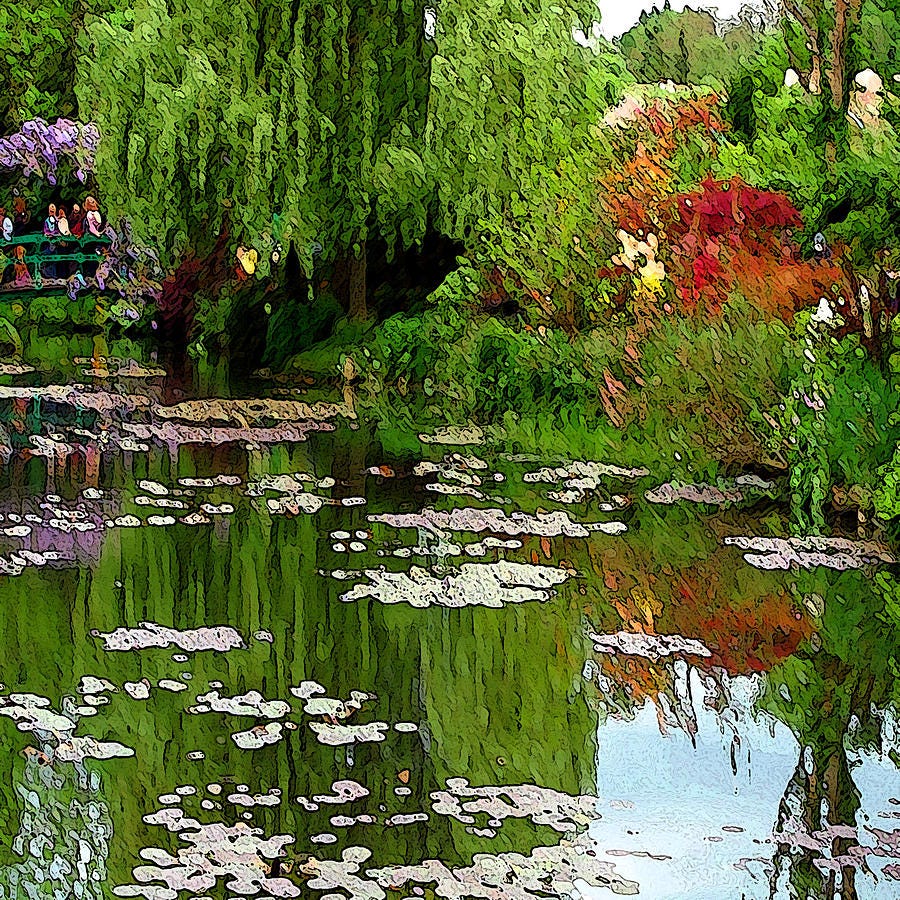How Microhabits Make Happiness
The Three Religious Emotions, Habit Formation, and the Power of Gratitude
1. Ingrate’s Lament
For three months straight, I began each morning by writing a thank you note. I started by writing to those closest to me and then worked outward. After that, I ordered the roster according to how much I disliked the person; the less I appreciated them, the sooner I bumped their name up the queue.
That December, January, and February were particularly bleak. Some winters in Kalamazoo get less sun than Seattle. The grim atmosphere is like a fertilizer for negative moods.
In the midst of my seasonal brooding, I noticed I was becoming an ungrateful person. The basic necessities of life were taken for granted – along with my job and school and friends and church.
As you’re probably aware, ingratitude is quite unappealing to be around. And I started noticing I didn’t even like being around myself.
So since I’m neurotic about habits, I tried to get proactive by carving out a new daily practice. I decided to start each day by writing a 500(ish)-word thank you note and see if that helped.
And of course, it did.
But what I didn’t realize at the time is that I was also creating a neural pathway that was making me happier.
2. Making Sense of Happiness
Despite how much we talk about happiness, we understand surprisingly little about it.
We don’t even have a universal definition. Not just among the general public, but even among psychologists, neuroscientists, and philosophers.
When “happiness” is scrawled across an Instagram still, what comes to most people’s minds is the rush of positive feelings that spring from pleasures like money, food, drink, winning, sex, success, or raising our social status.
So, as the logic goes, the more positive feelings you store up, the happier you’ll be.
This might be the popular understanding, but it isn’t what happiness actually is.
According to psychologists Sara Algoe and Jonathan Haidt, social scientists have been using “happiness” as a blanket term for positive feelings for so long that they’ve rarely stopped to ask what sensations or feelings “happiness” actually consists of.1
Rather than doing a biopsy on what happiness is, most researchers just asked if subjects felt happy.
Which meant that most people were probably interpreting the question as, “Are you experiencing a level of pleasure that you would consider good enough?”
Thankfully, Algoe and Haidt looked into it. When they examined what “happiness” was composed of, they found it was usually some blend of gratitude, awe, and elevation.2
These emotions – which have been called the “Three Religious Emotions” – might be more responsible for our overall subjective well-being than the sensations we typically associate with happiness.3 A growing body of empirical studies are coming to similar conclusions.4
Taken literally, this might indicate that “happiness” is just the title we’ve assigned gratitude or awe or elevation or some combination of the three.
Meaning, “happiness” might be more of an abstract, social construct than a tangible feeling on our emotional spectrum.
Which creates a conundrum. We’re all on the hunt for happiness, but the way we’ve defined it makes us look for it in the wrong directions.
3. The Three Religious Emotions
So, gratitude, awe, and elevation.
Gratitude is thankfulness (probably a no-brainer).
Awe is the feeling of being in the presence of something vast, unexplainable, or overwhelmingly beautiful.
Elevation is the feeling we get when we witness moral beauty.
Like I said, this trio has been called the “Three Religious Emotions.”
They earned this title because, unlike other emotions, these three have a positive effect on our moral actions and perceptions – causing us to become more kind, altruistic, and concerned for others.5
They’re “religious” in that those who experience them also feel more in tuned to God. Even if someone doesn’t believe in God, these emotions incline them to strike up a relationship – even if it’s just a vague feeling of connection to the universe.
While no one would love to burden you with a 6,000-word post quite as much as me, I must resist. We’ll cover awe and elevation more in the weeks to come.
This week we’re covering gratitude.
4. εὐχαριστίας
Gratitude gets us outside of our heads, causing us to see our luck or circumstances as the result of some enormous mystery.
Gratitude can’t really be directed inward; hence the uncommonality of telling yourself thank you.6 We can only feel thankful when we acknowledge that other wills and forces are involved. This is why many narcissists can’t feel thankful – their condition blocks them from considering how other peoples’ free will might’ve helped them.7
People who count their blessings daily exhibit stronger self-control than those who don’t.8
In tests where hired actors requested assistance from subjects, the grateful subjects were far more likely to help than the ungrateful.9
Thankful people are more likely to believe that character growth is possible,10 and they even sleep better at night.11
Gratitude on its own boosts our overall mood, but it works especially well when it’s attached to prayer.12
For example, one study split subjects into two groups. One was told to just think positively about others, while the other group was told to pray for others. After four weeks, the prayer group was in a far better mood and felt more grateful than the other group.
Similar studies have noted that gratitude significantly decreases anxiety.13 Which, I think, adds extra beauty to the fact that the famous anxiety passage – “do not be anxious about anything, but in everything by prayer and supplication with thanksgiving let your request be made known to God” (Phil. 4:6-7) – contains that component of thanksgiving. It’s as if the anxiety that forces our concerns inward is dismantled through pushing gratitude outward.
Importantly, gratitude also reinforces our belief in God’s goodness. Social scientist David DeSteno notes that gratitude “doesn't only increase belief in God; worshipping God also increases gratitude.”
They have a synergistic relationship. The more we feel grateful, the closer we feel to God; the closer we feel to God, the more we feel grateful.
This might be what G.K. Chesterton had in mind when he said that “thanks are the highest form of thought” and “gratitude is happiness doubled by wonder.”14
The last quote offers a perfect definition of what gratitude is: it’s happiness laced with wonder.
5. We’re All [Ungrateful] Thomas Now
Taken all together, it might be fair to say that gratitude is a perfect practice for cultivating deeper contentment.
Even though pursuing “the Kingdom of God and His righteousness” first and foremost is likely the simplest remedy to discontent (along with anxiety and scarcity mindsets; see Matt. 6:25-34), other techniques can help.
This isn’t to say that submitting our wills to God isn’t the best possible solution to the majority of our issues. It’s to say that every particular era demands particular disciplines to help us navigate life with God.
New techniques can’t save us;15 but they can help us deal with our unique contexts. And our milieu is uniquely ill-suited for remembering gratitude.
We’re far more often reminded of the things we don’t have or haven’t accomplished than the things we do have or have done.
Ingratitude is also exacerbated by modern technology, which often does for us what only prayer used to.
If you were an agrarian farmer circa 90 A.D., you couldn’t rely on sprinklers or fertilizer to get your crops healthy. You prayed for rain. When rain came, you praised God.
But if you’re a farmer in 2024, few components of your job will feel like they’re left up to luck or God’s will. It still is left up to God’s will, of course; it just doesn’t necessarily feel like it.
For the most part, a successful harvest is accomplished through irrigation systems and fertilization technology – things in your direct control.
Similar things could be said of medicine, wealth-distribution, and iPhones. They’re wonderful; but they can lead us to circumvent typical moments of gratitude.
Think about how many times you’ve prayed to God for something, gotten that something, and then forgot to thank God for the answered prayer because you just assumed it would’ve happened anyways.
All to say, building microhabits of gratitude might be a key practice for better worshipping God in our era.
6. Building Microhabits of Gratitude
Experiencing more everyday gratitude requires a bit of habit formation.
Building new microhabits – or, sure, let’s just call it what it is: atomic habits16 – is a matter of training ourselves to react to contextual cues (like getting in the car) with corresponding actions (clicking your seatbelt).17
Which always comes off tedious at first. You’re literally trying to form new neural pathway, reshaping a brain that would probably prefer staying the way it is.
But after awhile you’ll notice that it requires less motivation, interest, or conscious attention to perform the habit.18 This is because you’ve essentially outsourced the energy you once needed to perform the action into the context cue itself.19
So the more we train ourselves to respond to context cues (like waking up in a climate-controlled home with a salary that exceeds 2 dollars per day) with corresponding actions (like thanking God for His provision), the more we prime our brains to effortlessly repeat those feelings.
For example, to grow in gratitude, I decided that after my alarm goes off (context cue) I would immediately recite the Lord’s Prayer and rattle off three things I’m thankful for (action).
And of course, like I said in the intro, I also created a habit of writing thank you notes (action) whenever I first sat down in my office each morning (context cue). This literally helped so much.
Especially when I had to come up with ways to thank those people that I genuinely felt no gratitude for. It forced me to paint good where I only wanted to see flaws.
Lastly, I want to add a caveat.
I’ve been recently convicted by
’s CT article, which critiqued how many of us run our spiritual practices through a hyper-individualist grid. As much as it might pain me to say it, he’s spot on.I adore Rule of Life, and I’m still committed to my own rule of life; but we really have hit the point where prescribing more and more spiritual practices for the individual rather than the community may be doing more harm than good.
We need others. As Kurt Vonnegut said, we’re “chemically engineered” for community “just as fish are chemically engineered to live in clean water.”20 And our spiritual practices are supposed to knit us into a stronger web of others — not just reinforce a stronger self.
That said, this practice is perfect for community. In fact, it requires others. Gratitude must be directed outside of ourselves.
In fact, the earliest Christian practice was the Eucharist (from the Greek εὐχαριστία: “thankfulness”). It was a gathering built around food, each other, and thankfully remembering Jesus. Christian community is where we learn to gratefully receive every “good and perfect gift” as coming from God (James 1:17).
Some even call these three emotions the “others-praising” emotions because of the way they direct our minds to focus on others.21
Even better, experiencing these three emotions have been shown to make people feel closer to others, more trusting of strangers, and more open to cooperation.22
So, if anything, intentionally carving out moments for gratitude within our communities may be a perfect way to strengthen that community.
Thanks for reading Part Three (technically 3.1 — I know, I’m sorry, I’m a mess). Check out parts one and two if you missed it.
Sara B. Algoe & Jonathan Haidt, “Witnessing Excellence in Action: The “Other-Praising” Emotions of Elevation, Gratitude, and Admiration,” Journal of Positive Psychology 4 no. 2 (2009): 105-127; David DeSteno, How God Works: The Science Behind the Benefits of Religion (New York: Harper, 2022), 58-61.
For sake of scholarly scrutiny, Haidt and Algoe didn’t include awe in their original article, they used “admiration.” The reason that I subbed out admiration for awe is because, even though admiration is still sometimes included on lists of “self-transcendent” emotions (along with compassion and “kama muta” (Sanskrit for “being moved by love”)), research has since collapsed and consolidated many of the features of admiration amongst the emotions of elevation and awe.
David DeSteno, How God Works: The Science Behind the Benefits of Religion (New York: Viking, 2022), 59-64.
Patty Van Cappellen, “Rethinking Self-Transcendent Positive Emotions and Religion: Insights from Psychological and Biblical Research,” Psychology of Religion and Spirituality 9, no. 3 (2017): 254-263; José J. Pizarro, et al, “Self-Transcendent Emotions and Their Social Effects: Awe, Elevation and Kama Muta Promote a Human Identification and Motivations to Help Others,” Frontiers in Psychology 12 (2021): 709859.
K. Piff, Pia Dietze, Matthew Fein-berg, Daniel M. Stancato, and Dacher Keltner, “Awe, the Small Self, and Prosocial Behavior,” Journal of Personality and Social Psychology 108, no. 6 (2015): 883-899.
Has anyone ever done this? I’ve been brainstorming plausible circumstances for weeks and can’t come up with anything. And yes, uncommonality isn’t a word.
This is also due to the ways narcissistic personalities lack empathy. See Michael W. Kraus, Stéphane Côté, and Dacher Keltner, “Social Class, Contextualism, and Empathic Accuracy,” Psychological Science 21 (2010): 1716-1723; K. A. Muscatell et al., “Social Status Modulates Neural Activity in the Mentalizing Network,” Neuroimage 60 (2012): 1771-1777.
David DeSteno, Ye Li, Leah Dickens, and Jennifer S. Lerner, “Gratitude: A Tool for Reducing Economic Impatience,” Psychological Science 25, no. 6 (2014): 1262-1267.
David DeSteno, Fred Duong, Daniel Lim, and Shanyu Kates, “The Grateful Don't Cheat: Gratitude as a Fount of Virtue,” Psychological Science 30, no. 7 (2019): 979-988.
Christina N. Armenta, et al., “Functions of Positive Emotions: Gratitude as a Motivator of Self-Improvement and Positive Change,” Emotion Review 9 no. 3 (2027): 183-190.
Alex M. Wood, S. Joseph, J. Lloyd, & S. Atkins, “Gratitude Influences Sleep Through the Mechanism of Pre-Sleep Cognitions,” Journal of Psychosomatic Research 66 no.1 (2009): 43–48.
Nathaniel M. Lambert, Frank Fincham, Scott R. Braithwaite, Steven M. Gra-ham, and Steven Beach, “Can Prayer Increase Gratitude?” Psychology of Religion and Spirituality 1, no. 3 (2009): 139-49.
Alex M. Wood, John Maltby, Raphael Gillett, P. Alex Linley, & Stephen Joseph, “The Role of Gratitude in the Development of Social Support, Stress, and Depression: Two Longitudinal Studies,” Journal of Research in Personality 42 no. 4 (2008): 854-871; R. W. Lau & S. T. Cheng, “Gratitude Lessens Death Anxiety,” European Journal of Ageing 8 no. 3 (2011): 169-175.
Quote heavily disputed. Some maintain that Chesterton said this line in passing or in a letter, while others maintain that it is a conflation of his broader ideas about gratitude from Orthodoxy or his autobiography.
See
’s excellent treatment of Jacques Ellul’s idea of “technique” in his book You Are Not Your Own.I came up with this. Copyright original idea Griffin Gooch 2024.
B. Gardner, P. Lally, & J. Wardle, “Making Health Habitual: The Psychology of 'Habit-Formation' and General Practice,” British Journal of General Practice 62 no. 605 (2012) :664-666.
B. Gardner, G.J. de Bruijn, P. Lally, “A Systematic Review and Meta-Analysis of Applications of the Self-Report Habit Index to Nutrition and Physical Activity Behaviours,” Annals of Behavioral Medicine 42 no. 2 (2011): 174–187.
P. Lally, J. Wardle, & B. Gardner, “Experiences of Habit Formation: A Qualitative Study,” Psychological Health Medicine 16 no. 4 (2011): 484–489.
Kurt Vonnegut, Wampeters, Foma, and Granfalloons (New York: Delacorte Press, 1974).
Algoe, Haidt, Witnessing Excellence in Action: The “Other-Praising” Emotions of Elevation, Gratitude, and Admiration,” 105-127.
A.M. Sparks, D.M.T. Fessler, & C. Holbrook, “Elevation, an Emotion for Prosocial Contagion, Is Experienced More Strongly By Those with Greater Expectations of the Cooperativeness of Others,” PLoS ONE, 14 no. 12 (2019): e0226071; DeSteno, How God Works, 59-64.








I love the way you weave together so many disparate subjects here in a common thread. Really thought provoking stuff, especially how to balance individual prayer with community…
When my husband was deployed we started praying the Angelus at noon and 6pm. We were about 6hours apart so it lined up perfectly. I think it really helped during that deployment to have that touchstone we could pray together even though we didn’t always have the ability to talk on the phone….Not to sound all Catholic triumphalist, but I do think the Divine Office is great for marking the day with prayer and gratitude and easing this tension between individual and communal life. Even when you pray alone, you know you’re joined by other Christians around the world and it’s easy to pray alone or in a group.
Excellent post. it did leave me wondering how all of this hooks up with william james. Maybe a future post?